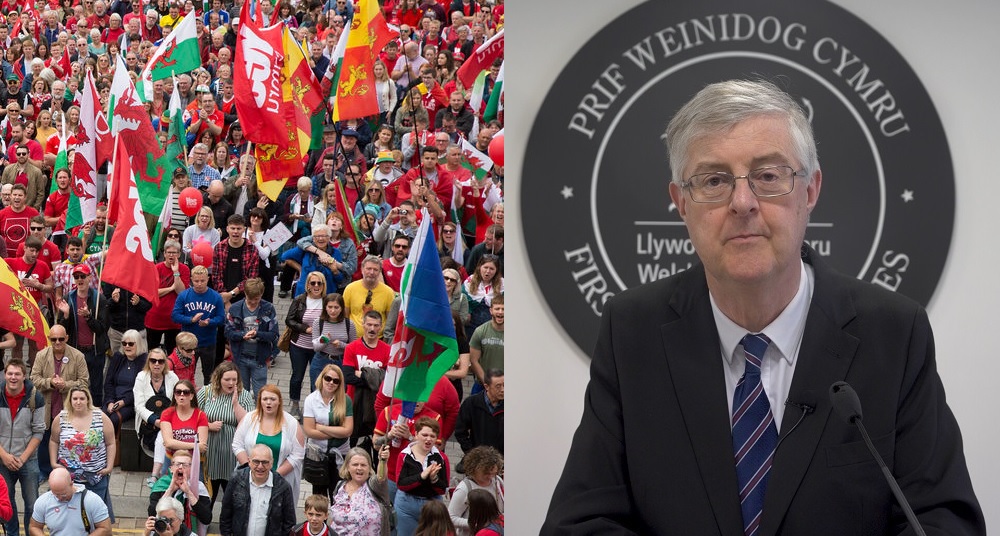If Drakeford wants to stop independence, his arguments should deal in facts – not fantasy

John Ball, former lecturer in economics at Swansea University
One of the interesting consequences of the growing support for independence is that the previously sleepy UK media is showing finally noticing the movement, the latest being the Financial Times.
I do not know how many members of the Senedd bother with the FT, but one who clearly does is the First Minister, using the paper once again to bend the truth when asked about independence.
Presumably, his contribution was intended to impress the readers of this worthy business newspaper. But what he succeeded in doing was emphasising his economic illiteracy.
According to the newspaper he “told the Financial Times that Wales could never have secured so many Covid-19 vaccines as a small independent nation, and also questioned how the country could have its own currency, given the 160-mile long border with England was crossed by hundreds of thousands of people each day”.
There’s quite a lot of obfuscation packed into a short paragraph so let us unpick them one at a time.
The answer to what currency an independent Wales would use is, of course, the pound. There is no reason why, in an independent state, the pound could not continue to be used.
There are different systems; the first and obvious is a Currency Union, such a currency union based on the pound already exists. There is a nine-member sterling currency union and although most of its members are not sovereign states, they are to a greater or lesser extent self-governing. Indeed, in many ways Wales is already a member of this union.
In the absence of a currency union Sterlingisation – the use of the pound without the consent of the Bank of England – would be an alternative and is seen by any economists as the way forward.
Support for sterlingisation (in Scotland but applies equally to Wales) has come from two important sources. Lord Mervyn King, former Governor of the Bank of England has pointed out that there is no reason why Scotland could not continue to use the pound within such a scheme. The think tank Adam Smith Institute has suggested that sterlingisation not only allows continued use of the pound but would stimulate the economy.
The use of non-domestic currency is in fact quite common – many countries have such an arrangement. There are (other than sterling) nine currency unions, nine countries or dependencies outside the Eurozone use the Euro, eleven countries the US dollar, seven share the East Caribbean Dollar, nine the West African Franc and five the Central African Franc.
The 19 countries currently using the Euro do not have a domestic currency. In a lesson for Wales, the five fastest-growing economies in Europe (the three Baltic States, Slovenia and Slovakia) use the Euro which is clearly not their domestic currency.
Borders
In a further astonishingly uninformed view of the facts, Drakeford added that as a small independent nation, Wales could never have secured enough Covid vaccines.
He has forgotten that Astra Zeneca vaccine is produced in Wrexham, or perhaps in his restless enthusiasm to disparage independence, he has forgotten that Wrexham is in Wales.
But it also ignores the evidence on vaccine availability and distribution by the small nations of Europe is exemplary.
By January Sweden had already accessed 20million doses and Norway 5 million. In addition to their domestic responsibilities, both nations immediately ensured that doses would be available to poorer countries in the world. The UK has not.
Ireland had no problems accessing 5.5 million doses and has immunised over a third of the population; has as Finland. Malta has immunised over a half and Denmark will have immunised the entire population by the end of June. Not bad going for small nations unable to access the vaccine.
The First Minister does not seem to have a grasp of mathematics either. His final claim in the Financial Times interview was that the 160-mile-long border with England is apparently a hurdle to independence.
Finland has two borders, each over 1000 miles long so one wonders how they manage.
Apparently, the border with England is crossed by “hundreds of thousands each day.” Given that the entire population of East Wales is just over 600 thousand, these hundreds of thousands probably explain why Cardiff, Newport and Wrexham are entirely empty of people between nine and five.
The First Minister may indeed not be a supporter of independence, but can we please have facts and not fantasy?
Support our Nation today
For the price of a cup of coffee a month you can help us create an independent, not-for-profit, national news service for the people of Wales, by the people of Wales.






